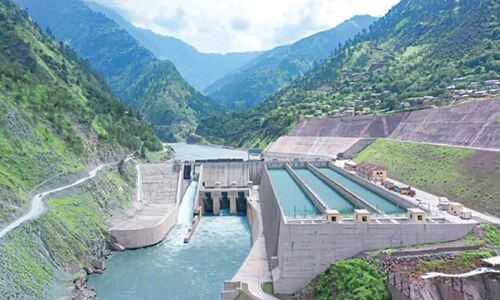 AS summer approaches and temperature sizzles, the people will find no respite and continue to endure longer hours of power failure due to failed policies of the present government over the last eight years.
AS summer approaches and temperature sizzles, the people will find no respite and continue to endure longer hours of power failure due to failed policies of the present government over the last eight years.
Despite countless warnings, news reports and comments, the government, Wapda and the Kesc have failed to take notice and adopt measures to provide relief to the public at large.
With the power structure in a shambles, there has been no improvement in the networks, and no maintenance has been carried out during the last six months. There has also been no addition of power to the national grid. The result is that even in the winter months, the demand-supply gap has widened to 1300 MW, creating 11 per cent power shortage, and resulting in three to four hours of loadshedding in large cities, and upto six hours in the rural areas.
The situation is expected to worsen in the coming days with the rise in temperature. As the power demand increases, the demand-supply gap will widen to 3000 MW during the peak summer months, resulting in longer hours of unscheduled load-shedding and power failures, hitting hardest during the peak hours of evening.
The privatisation of Kesc was yet another fiasco like the Steel Mill, and a failed policy of the government. Despite tall claims of the government that Kesc would invest over $500 million during the next three years, including $75 million in 2005 – 2006 alone, none materialised.
The Kesc was handed over to a group which did not have any experience of running a large power utility. And Karachi is not only large, but the economic hub of Pakistan. Continued power failures will further cripple the national economy.. Industries are already agitating the high electricity tariffs. It will result in rising inflation, already above nine per cent. The agro-based industries will be hit harder by longer hours of power failure and load shedding.
Despite numerous solutions presented to the government through the press and seminars, the government has lent a deaf ear and has continued with expensive solutions, including setting up of rental power plants in the Punjab at much higher tariffs than conventional rates. The government continues to pursue expensive options as they lead to higher kickbacks. There are a number of low cost efficient solutions available, including converting the old fashioned conventional steam power plants to combined cycles. Yet another solution could have been to opt for co-generation in new power plants. Unfortunately, it is the people of Pakistan who will pay these high tariffs.
Wapda has already drained the government of Rs84 billion in the form of subsidies, deferred debts and equity injections. The oil shipment bill for 2007 is expected to exceed $8 billion (at the current oil prices). With the trade deficit exceeding $12 billion, and with the changing geopolitical scenario, there could be further increase in oil prices, and the economy could suffer further by the end of the year. Solutions are urgently needed to overcome power shortage.
The only option available to save the public at large, from the looming crisis, is conservation. Conservation will also contribute to climate control and lessen the stress on global warming. Each one of us must play a role in this direction.
Take the typical case of Karachi. Since privatisation, the breakdowns have become frequent from 4,000 to 6,000, some times exceeding 30 per day. Also at times, we have experienced power shortages of over 400MW last summer during peak hours as a result of breakdowns, load shedding and non-supply of electricity by Wapda. This is expected to worsen this year and may exceed 600 MW.
Consumers need to take remedial measures in their own hands by conserving power. This will reduce power failure and load-shedding. If the usage of individual air- conditioners in Karachi is reduced by one-third, about 200 MW alone would be saved. If all customers switch off only one 100W light bulb, 100 MW would be saved.
If all TV sets were not on standby, 20 MW would be saved. If the evening shops and commercial plazas were asked to cut down their lights to half as much as what they use, another 10 MW would be saved. By turning lights, fans and air-conditioners off while leaving a room or not in use, and such other conservation measures, will save yet another 30 – 40 MW.
One can easily conserve over 350 MW in Karachi alone by adopting these measures. Applied on a national scale, it may conserve up to 3000 MW nationwide. This can only be the first step so that this summer can pass comfortably for all of us. Beyond this we expect the government, Wapda and Kesc to have put in sound and inexpensive policies, and implement them successfully to fulfil the shortage of 3000 MW this year alone, and plan for an eight per cent growth every year beyond this.
Senator Dr Javaid R. Laghari is a member, Senate Standing Committee on Water & Power.















































Dear visitor, the comments section is undergoing an overhaul and will return soon.